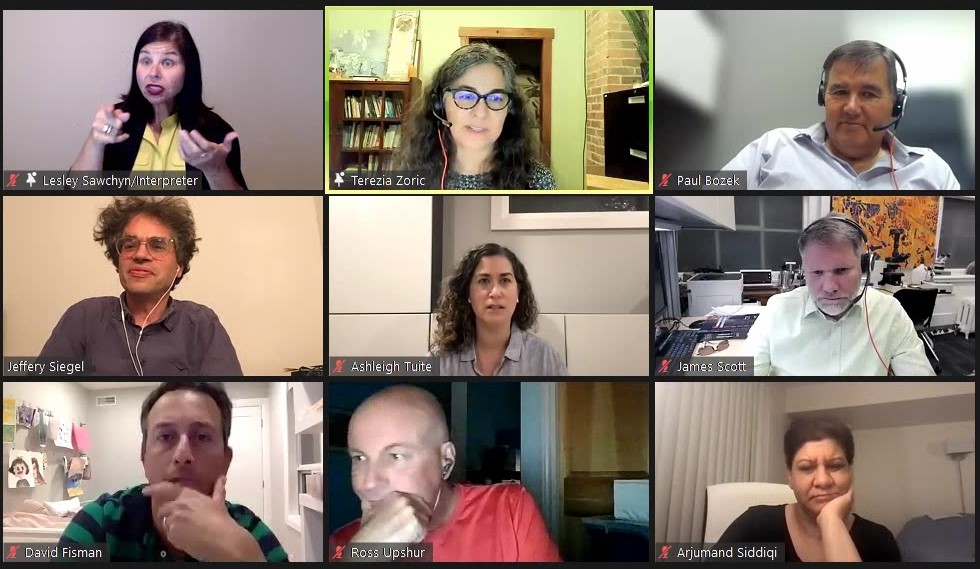Union head says Ryerson’s reopening plan ‘not supported by any science’

The Canadian Union of Public Employees (CUPE) Local 3904 president criticized Ryerson’s plan to remove all restrictions and capacity limits for the winter term at a Sept. 9 virtual town hall.
“[Ryerson’s] administration indicates that they intend to remove all restrictions and capacity limits in instructional spaces for the winter term. At this point, this decision is not supported by any science,” said Laurie Jacklin, in a recorded statement played at the town hall.
The university has released an outline of its return to campus plan for the fall semester, but hasn’t yet released details about what on-campus activities will be permitted starting in January 2022.
CUPE Local 3904 represents contract academics at Ryerson University, including contract lecturers, continuing education contract lecturers and graduate and teaching assistants.
The event, “Is it safe enough to return to campus? What do public health scientists say,” was hosted by the Toronto Inter-University Coalition on Zoom.
The coalition consists of four faculty associations and unions that represent faculty, librarians, counsellors, academic and non-academic staff across four Toronto universities: Ryerson, OCAD University, University of Toronto and York University.
The town hall also featured statements from OCAD Faculty Association, CUPE 3902 and CUPE 3903, as well as a seven-member panel of infectious disease and occupational health experts from the Dalla Lana School of Public Health. The panellists spoke about the insufficient protections for staff and students on campuses as restrictions are lifted.
University presidents persuaded the Ontario government to give universities an exemption from Step 3 restrictions, despite the advice from the Ontario Science Table, said Terezia Zorić, the panel’s moderator and president of the University of Toronto Faculty Association.
According to Zorić, this led to some Toronto universities increasing indoor capacity, abandoning physical distancing, increasing the number of large gatherings and increasing the frequency of contact.
In an open letter, Zorić called on University of Toronto president Meric Gertler to denounce his support of the Council of Ontario Universities lobbying the provincial government to exempt universities from the indoor occupancy limits that protect against overcrowding and mitigate the risk of COVID. A decision which she said in the letter, has “no good scientific rationale for this political move.”
“I don’t know any scientists who endorse the approach of relaxing these kinds of guidelines, particularly in en masse scenarios,” said Arjumand Siddiqi, a social epidemiologist at the Dalla Lana school. “We’re in classrooms for hours and I haven’t heard anyone say that this seems like a reasonable approach. I think there is a lot of concern about the fact that if we were to [ease restrictions], the motivations are decoupled from the goal of maintaining some control of the pandemic.”
According to its website, Ryerson has already begun to ease physical distancing and capacity limits for in-person extracurricular activities and on-campus support and services.
“One of the most startling realizations during ongoing discussions is the extent to which our employer focuses on restarting the organizational machinery rather than concentrating on the safest environment possible for every person,” said Jacklin. “We constantly encounter a bureaucracy that considers COVID as an operational [in]convenience, rather than a large-scale public health and safety hazard.”
Despite the early optimism of the vaccine, a lingering unvaccinated population and the highly contagious Delta variant can allow for overwhelming COVID transmission if other measures aren’t in place, said Dr. Ashleigh Tuite, an infectious disease epidemiologist at Dalla Lana.
Tuite warned that the highly transmissible Delta variant within indoor spaces is a cause for concern. According to her, reducing time spent indoors, maintaining physical distancing, ventilation, properly fitted masks, testing and contact tracing were some of the measures needed in addition to vaccinations to mitigate spread of the Delta variant.
“We need to think of other ways that we can reduce opportunities for transmission to happen, particularly in indoor settings, because we know indoors is where transmission happens the easiest,” Tuite said.
Classrooms are not the only area of concern on campus. Enclosed spaces with high traffic, such as bathrooms, can be an area of multiple pathway transmission for infectious disease, according to University of Toronto civil engineering professor and air filtration specialist, Jeffrey Siegel.
“I’m very grateful to all the university faculty associations continuing to push because you need the whole package, you can’t just pick and choose [which restrictions you follow],” said Dr. David Fisman, an infectious disease expert at Dalla Lana.
Fisman spoke about how preventive measures and restrictions need to be used together to be effective.
“When you use these things, they actually really do protect people in a [compounding] manner. So you do need all the different layers to keep people safe,” he said.
“You can’t reason with the virus and say, ‘We’re prepared to do the masks and the vaccines, but we really can’t limit class sizes.’ The virus doesn’t care.”
Ryerson’s president, Mohamed Lachemi, was not able to provide a response by press time to multiple requests for comment made by On The Record.
In a statement released in an Aug. 13 email and press release, Lachemi said that Ryerson will work to include vaccination requirements as part of the anticipated return to campus in January.
Lachemi also stated that Ryerson University continues to promote vaccination efforts, adherence to its mask policy and procedures and will maintain the safety protocols the university has put in place on campus in order to make the campus as safe and welcoming as possible for everyone.
Elizabeth Benner is the Health and Science Reporter at On The Record for Fall 2021. She has a BSc. From the University of Toronto.

